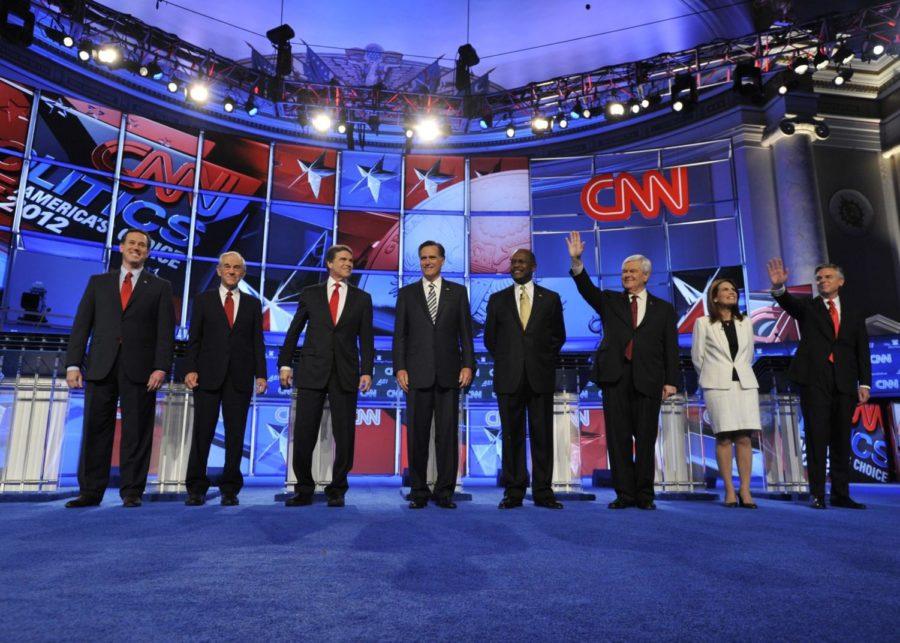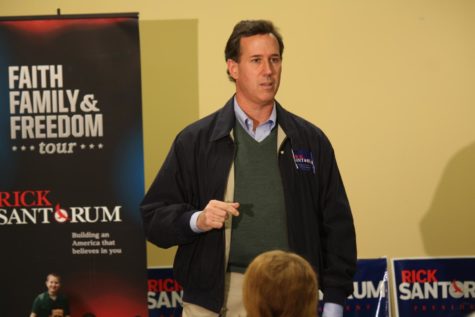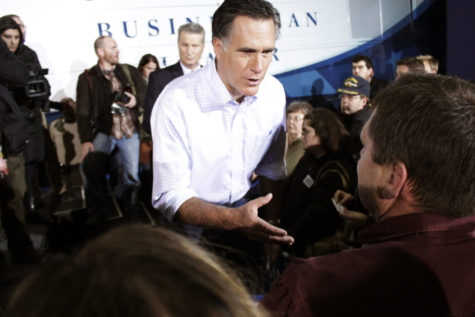Belding: With lack of personality among candidates, expect long race
The Republican candidates at the CNN Republican National Security Debate held at Constitution Hall. Left to right: Former Pennsylvania Sen. Rick Santorum, Texas Rep. Ron Paul, Texas Gov. Rick Perry, former Gov. of Massachusetts Mitt Romney, former CEO of Godfather’s Pizza Herman Cain, former Speaker of the House Newt Gingrich, Minnesota Rep. Michele Bachmann and former Gov. of Utah Jon Huntsman.
January 8, 2012
Because my political interests stretch back to my years in middle school, family members often ask me about politics when we all get together for the holidays. This year is no different. At each holiday family function, people asked what I thought about the slate of candidates this time around, and who I supported.
I didn’t know what to tell them. I’m a Republican, and have always thought of myself as a conservative. But none of the candidates this time around are exciting. None seems presidential. None seems to have an ambitious vision for American public life.
None seems to understand that doing politics is centered around the Congress that debates and makes policy, not the presidency that implements it and brings it to the American people.
Up until writing down my vote on the caucusing ballot, I had no certainty about who I’d vote for. At least with Obama we were fired up and ready to go four years ago (although I voted for McCain).
The swift rises and falls of candidate after candidate reflect astonishing weakness in the party. It now seems like the eventual nominee will either be Mitt Romney, who reignited his suspended campaign of almost four years ago, or the candidate who can time his skyrocketing popularity to that of the early caucuses and primaries and parlay his wins into lots of publicity.
The candidates’ polling history tells me that Republicans in Iowa are increasingly desperate, maybe even frantic, to find a candidate to support. My theory is that populism and idealistic trying to obtain grass-roots support — telling people what they want to hear instead of daring to defy popular opinion — is leading many candidates away from their own original ideas.
Where is the positive personal stamp of each candidate on his or her campaign?
They all seem to be against “Obamacare,” expiring tax cuts, regulation and foreign intervention. And many of them support marriage and life amendments to the Constitution or, at the very least, laws against gay marriage and abortion that, given legal decisions issued years ago, are next to unconstitutional.
None of the candidates seems substantially different from the others. In my own opinion, that is why none of them can gain a lasting edge over the others. When each has more or less the same ideas and is similarly lacking in personality vis a vis the others, none can gain enduring traction.
Adherence to this year’s political orthodoxy is weakening the field of candidates. Ideas, which can do nothing for themselves, which always need a person to put them into place, are more important than the people who have to debate, decide and live with them.
We are in the habit, this year, of discarding those candidates who do not share our ideas or meet our standards of intellectual righteousness. We care more about making sure candidates hold the ideas it is now party heresy to question, than about finding a candidate who can build coalitions based on his own talents as a statesman on the campaign trail and in office.
First to rise and fall was Michele Bachmann. Until July 10, she was at or below 12.7 percent. A few days later, she was polling at 27 percent, where she remained until Aug. 25. Then she spent six weeks at 19 percent, and two weeks after that plateau started eroding she reached 10 percent, which she’s stayed under since Oct. 16.
Second was Rick Perry. After his Aug. 13 entry into the race, it took him until Sept. 17 to climb to 25 percent, which he held until Oct. 6. Then he dropped to 10 percent in as many days and has polled around 10 percent since then.
Third was Herman Cain, who polled at less than 10 percent from July through early October. Then he rose to 30 percent by Oct. 26 and began his descent, which ended at 8 percent.
Fourth was Newt Gingrich. Before Oct. 15, he was below 6 percent. Two months later, he was at 31 percent. From there it took him three and a half weeks to decline to 13 percent.
Fifth was Ron Paul. Before December, he hovered between 10 and 13 percent. By Christmas, he’d peaked at 23.8 percent. Since then, he has slipped a few points.
Rick Santorum’s campaign apparently timed his rise correctly. Before Dec. 27, he polled under 8 percent the whole race. By caucus night, his support had doubled, to 16.3 percent.
As I write this, Romney and Santorum have about 24 percent, Paul has almost 22 percent, Gingrich has 13.3 percent, Perry has 10.1 percent and Bachmann has 5.6 percent.
My prediction? It may very well be a long race to the Republican Party’s national convention as the personality-less candidates wage their contests in states they think they can win while ignoring the ones they don’t expect to do well in. Maybe we should expect three-way races until the convention.









